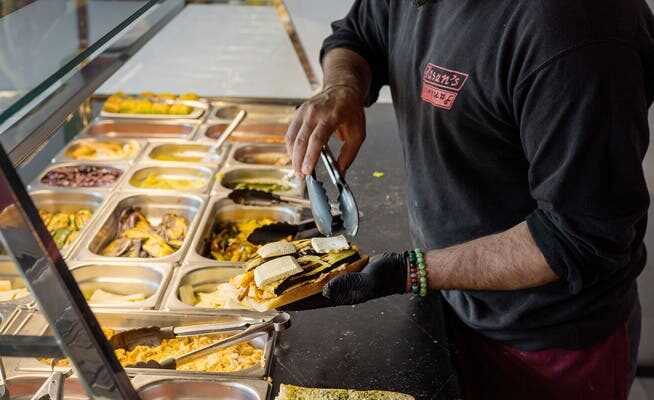From guest worker’s son to gastronomy entrepreneur: the story of a city original.
He makes the best sandwich in town, if not in the country: Hasan Kandil in his Winterthur restaurant.
When Hasan Kandil makes a sandwich, it looks like a dance that he is doing with his hands.
With an elegant sweep, he spreads four pastes on two halves of bread: paprika, olive, hummus and tomato. He gently drapes the roasted vegetables on top, plucks the aubergines, folds the courgettes. Then comes a piece of soft cheese, and after a short interlude in the mini grill, rocket, a drop of hot oil and a dab of tsatsiki follow.
The result is crispy, creamy, salty and juicy. Each bite brings a new flavor: a little black olive, a sweet pepper, earthy tofu. The meat variant comes with Turkish garlic sausage, pulled chicken or roast beef. Wait a few minutes and the best sandwich in Winterthur, which could well be the best in the canton, even in the whole of Switzerland, costs exactly 10 francs.
“Anyone can make a sandwich,” says Hasan Kandil. “But it all depends on how you do it.”
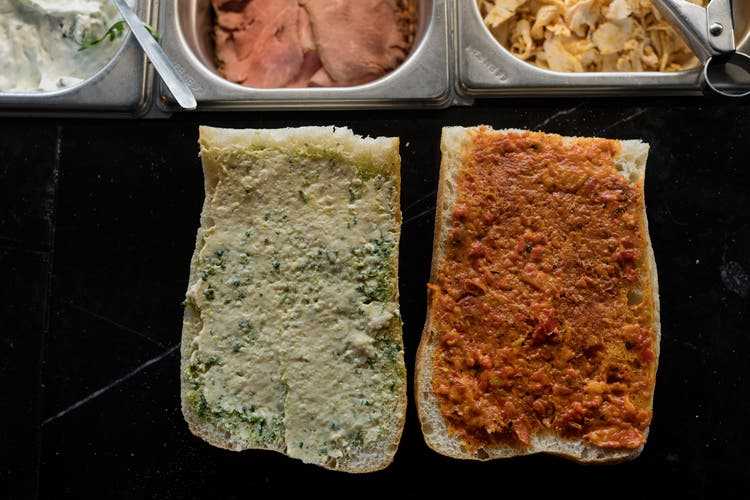
Hasan’s sandwich, step 1: Four homemade pastes are worked into the bread in no time at all.
In Winterthur, “Hasan’s Sandwich” on Technikumstrasse has cult status. At noon, the queue stretches far out onto the street. His stand is the most popular at the music festival weeks. And when you move from Zurich to Winterthur as a young person, Hasan’s shop is the first thing the locals want to show you.
Up until a few years ago, his business was still a micro-enterprise without its own name. Now it has two branches, ten employees – and its owner is nicknamed “Sandwich King”.
None of this was planned, says Hasan Kandil. “I never advertised the sandwiches. I was actually brought here by chance.” Coincidence – and a feeling for good business.
The boy with the sesame rings
Anatolia, 1987. A hot summer in a small mountain village. A six-year-old boy balances a tray of sesame rings on his head. He sells them for a few Turkish lira during the school holidays. The boy has no passport and his birth was never reported to the authorities. To this day he does not know when his birthday is.
The boy is Hasan Kandil and he is doing his first business.
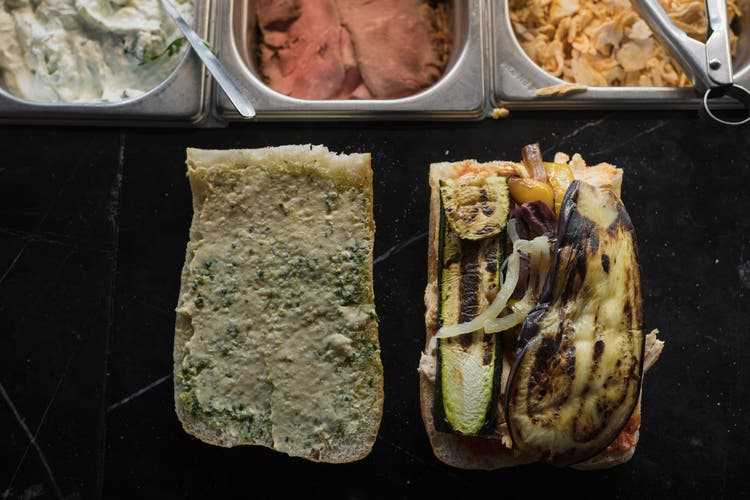
Hasan’s sandwich, step 2: The grilled vegetables are gently draped.
Today his sandwiches are still inspired by the old country – the grilled vegetables, the good olive oil, the pepperoni paste that is served there. Twice a week at half past three in the morning Hasan Kandil drives to the wholesale vegetable market in Zurich Altstetten and buys in bulk what he wants in his sandwiches. He makes all the pastes, spreads and sauces himself.
«A good sandwich takes time, preparation – and of course love.»
The guest worker’s son
Boswil in the canton of Aargau, 1990. Rural idyll in the Mittelland. A student comes to the village school. He’s the first foreigner here, and everyone is fighting about him, wanting to teach him German. The student moved here because of his father, who has been a construction worker in Switzerland for four years and is only now allowed to have his family move with him.
The student is Hasan Kandil and he has just been catapulted into a new world.
Young Hasan quickly learns German and gets used to life with a car, television and telephone. But his goal is not big money. Not in his sandwich shop today either. “I could easily raise the prices, but I don’t want to. Students, grandmothers and single parents should also be able to afford it here.”
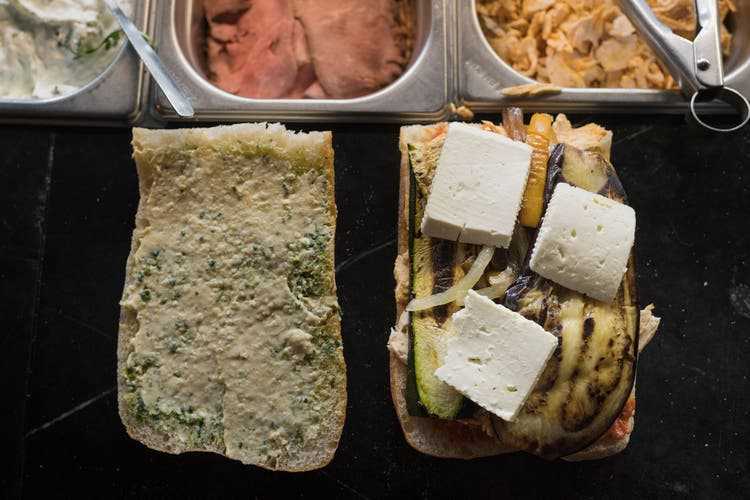
Hasan’s sandwich, step 3: «Halloumi, feta or mozzarella?»
For this Hasan has expanded. In 2020 he opened a second branch where he sells mezze and filled pocket breads: the “Sumak Sumak” at the Obertor. Again the principle is simple. Again the ingredients are simple but good. People are queuing again. For the homemade flatbread with falafel, for example, which with a little mint, pomegranate juice and olive oil comes along so lightly, as if the chickpea balls had only gently kissed the fat.
Hasan Kandil develops all the recipes himself. He simply cooks what he likes to eat himself, he says. Business is good here too.
And so, for the first time in his professional career, Hasan Kandil can afford not to stand behind the counter every day from early morning until late at night.
“My problem is that I really like my job. That’s why I didn’t realize for a long time how much I work. Especially at the beginning, I was often on my feet from 3:30 a.m. to 9:00 p.m.»
The greengrocer with the good idea
Winterthur, 2000. A small greengrocer’s shop on a pretty alley in the old town. A young man starts to work here on a temporary basis. He has just broken off his apprenticeship as an apparatus engineer. He likes the atmosphere when he goes shopping in the morning, chatting with customers, the quality of the goods. A few years later he takes over the shop, which makes just enough money to make a living from it.
The young man is Hasan Kandil and he has just laid the foundation for his business advancement.
He just doesn’t know yet.
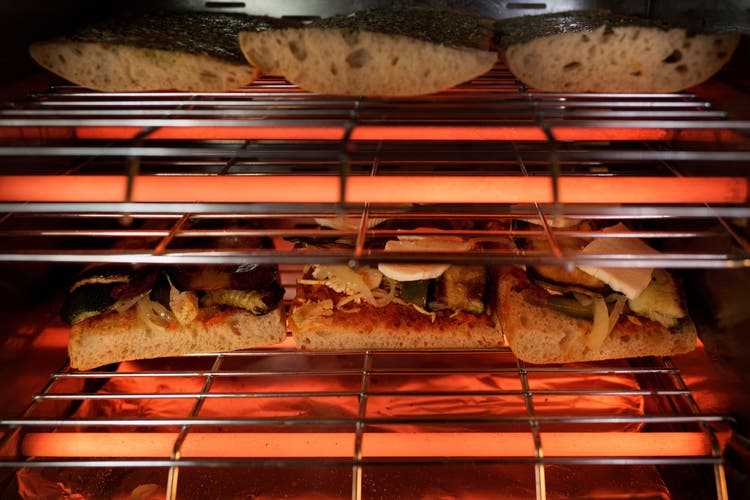
Hasan’s sandwich, step 4: crispiness thanks to a few minutes of mini grilling.
Because first of all, Hasan’s nameless shop is a vegetable like many. With a large assortment, small margins – and a lot of waste. “If the vegetables don’t look perfect anymore, nobody buys them anymore. But I just don’t like throwing food away.”
So he brings his remaining items home to his flat share. The fridge will soon be overflowing with vegetables. “At some point my roommates had enough of it. So I had to take it somewhere else.”
So Hasan cooks Kandil. He roasts and mixes pepperoni and aubergines, he makes olive paste and pesto, he roasts vegetable slices. He installs a tiny sandwich counter in his shop – and waits. On the first day he sells exactly one sandwich. “It took me forever to make it. The woman almost fell asleep.” But three days later she comes back with two friends. “She said: Hasan, you just have to be a little faster this time.”
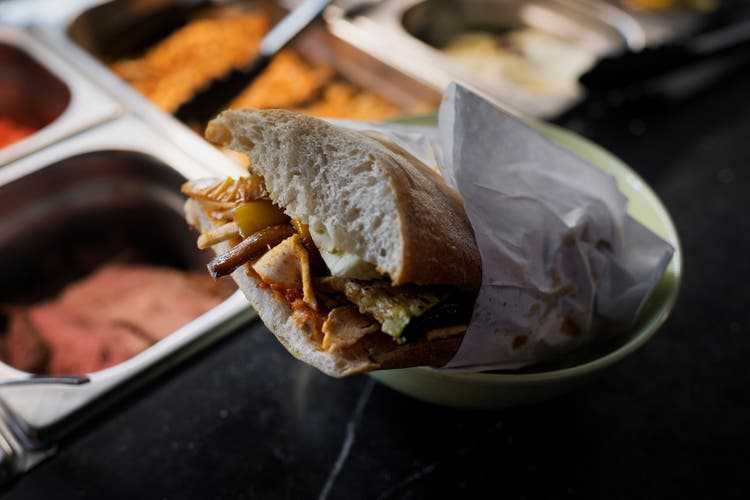
Hasan’s sandwich, step 5: a dab of tsatsiki, a drop of spicy oil, some arugula – and that’s it.
Two months later, the line at Hasan’s store is so long that his veggie customers are leaving, upset – and he decides to make sandwiches his main business. He makes dozens of them every lunchtime and every evening. His hands are turning the bread halves into the Winterthur cult food that his sandwiches are today, faster and faster.
Meanwhile, no one complains about the waiting time anymore. On the contrary: visiting Hasan has become a ritual. Watching the preparation is part of the taste.
And when Hasan Kandil addresses you by name for the first time at lunchtime, even as a newcomer you know: Now you belong here in Winterthur.
